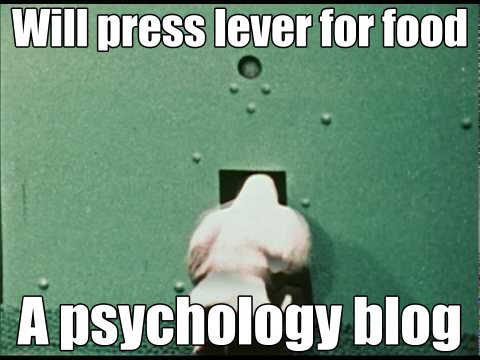To test this, Potter and Levy (1969) came up with the rapid serial visual presentation (RSVP) task. In its most basic form, a series of letters flash up one at a time in front of you. You're asked to look for an 'X' (T1). If you spot the X you then have to process it. This processing takes time and cognitive resources, thus creating a blindspot. Any letter (T2) presented within that blindspot gets lost and studies show this blindspot occurs between about 100ms and 300ms from the X (or whatever letter you're asked to look for). The phenomenon is called the attentional blink (AB).
So far so good. But psychologists were curious. Is it just that we can't see T2 at all or is it that we see it and process it in our brains but, for some reason, don't pay any attention it. Shapiro, Driver, Ward and Sorensen (1997) did something very clever. They had three target letters instead of just two. The second would be presented during the AB (the blindspot) and therefore go unnoticed by the participant. However, the twist was that they added a priming effect to T2 which would affect T3. What they did was in a stream of numbers, T2 would be a letter and T3 would be the same letter but in a different case. The idea was that if participants were more successful at noticing T3 if T2 had primed them toward it (as opposed to participants who were not exposed to the T2 as a primer) then it would suggest we really do process these things even if we say after that we didn't see them. Well, as I am sure you have guessed this is what they found.
Right, so now we know it is very likely we see things we don't notice and that we process them well enough that they can have an effect on other things we see. There was another study by Shapiro, Arnell and Drake (1991) which looked to see if colour was affected by the AB. It turned out it wasn't. So if you saw the X and then a colour was presented within the AB period you could report what that colour was. A few years later, though, another team of researchers (Ross & Jolicoeur, 1999) went a step further. They added a series of alternating colours after the first colour. They wondered if this created what they called chromatic masking. It did. In their experiment, the AB returned for participants who were asked to identify a colour when that colour was followed by others.
I included those two studies because it is a good example of how psychology (and science in general) works. The first study wasn't wrong. It researched a phenomenon and reported the results. But those results raised other questions and along came someone else who tried to answer them. That's how knowledge is built upon. But it is also what leads people to mistakenly believe that science is always changing its mind. It isn't.
There are lots of other studies which looked at the AB. Another one investigated what would happen when T1 was accompanied by a noise (Olivers & Van de Burg, 2008). What happened was that the AB vanished for T2. Another study (Shapiro, Caldwell & Sorensen, 1997) used the participant's name in T2 and that got through the AB as if it wasn't there. The same thing happens for emotionally negative words (Anderson & Phelps, 2001). The last of those studies had participants with damage to the part of their brain called the amygdala. It seems it is the amygdala which decides which stimuli are important and need to be passed on to higher processes and which can be safely discarded.
This goes some way to explain how it is we miss things but also why we tend to notice the really important things most of the time. So when you're driving you might not notice the marching band on the side of the road but you will notice the child bouncing a ball among a crowd of people.
Refs
Ross, N. E., & Jolicœur, P. (1999). Attentional blink for color. Journal of Experimental Psychology: Human Perception and Performance, 25(6), 1483.
Shapiro, K. L., Caldwell, J., & Sorensen, R. E. (1997). Personal names and the attentional blink: a visual “cocktail party" effect. Journal of Experimental Psychology: Human Perception and Performance, 23(2), 504.
Shapiro, K., Driver, J., Ward, R., & Sorensen, R. E. (1997). Priming from the Attentional Blink: A Failure to Extract Visual Tokens but Not Visual Types.Psychological Science,8(2), 95–100.
Van der Burg, E., Olivers, C. N., Bronkhorst, A. W., & Theeuwes, J. (2008). Audiovisual events capture attention: Evidence from temporal order judgments.Journal of vision, 8(5), 2.
